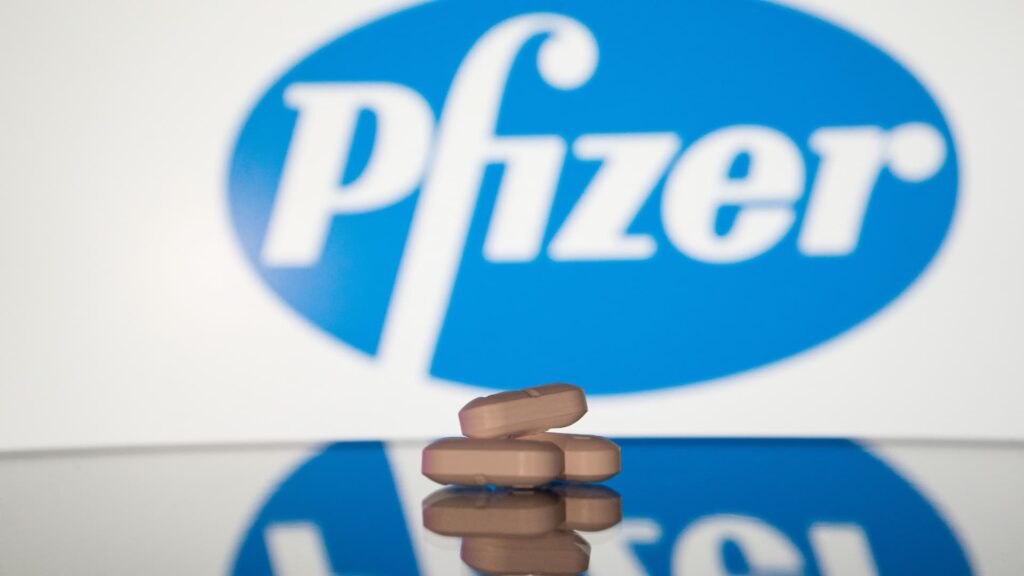
Discontinued Weight Loss Medication: Pfizer Scraps Danuglipron After Liver Injury
Discontinued Weight Loss Medication: Pfizer Scraps Danuglipron After Liver Injury
Pfizer’s headquarters in New York. The company announced the discontinuation of weight loss medication danuglipron after a patient experienced liver injury in clinical trials. Photo: Nikos Pekiaridis/Getty Images
Table of Contents
Discontinued Weight Loss Medication: What Happened
Pharmaceutical giant Pfizer announced on Monday that it has terminated development of its once-daily weight loss medication danuglipron after a patient experienced a liver injury potentially caused by the drug during clinical trials. This discontinued weight loss medication adds to Pfizer’s growing list of setbacks in the highly competitive GLP-1 weight management market, which analysts project could be worth more than $150 billion by the early 2030s.
According to Pfizer’s statement, the patient did not experience any liver-related symptoms or side effects while taking the discontinued weight loss medication. However, monitoring revealed elevated liver enzymes—a potential indicator of liver cell damage—which “recovered rapidly” after the patient stopped taking danuglipron. The concerning liver issue emerged during a trial that employed a rapid dose escalation protocol over a short period.
“While we are disappointed to discontinue the development of danuglipron, we remain committed to evaluating and advancing promising programs in an effort to bring innovative new medicines to patients.”
— Dr. Chris Boshoff, Chief Scientific Officer, Pfizer
The decision to classify danuglipron as a discontinued weight loss medication came after “a review of the totality of information, including all clinical data generated to date for danuglipron and recent input from regulators,” Pfizer stated in its release. Despite abandoning this particular GLP-1 candidate, the company emphasized its ongoing commitment to developing other weight loss treatments, though it now lags significantly behind market leaders.
Understanding the Liver Injury Concerns
The liver injury that prompted Pfizer to add danuglipron to its list of discontinued weight loss medication represents a recurring challenge in obesity drug development. Elevated liver enzymes—specifically alanine transaminase (ALT) and aspartate transaminase (AST)—often indicate damage to liver cells and have been linked to several experimental weight loss treatments in recent years.
While Pfizer noted that the rate of elevated liver enzymes in danuglipron trial participants aligned with those observed in approved GLP-1 drugs, the specific case that triggered the discontinuation appeared concerning enough to halt further development. The company’s safety database included more than 1,400 patients who had taken the now-discontinued weight loss medication.
Key Points About Liver Safety in Weight Loss Medications
- Elevated liver enzymes (ALT/AST) are sensitive indicators of liver cell damage
- Rapid dose escalation may increase the risk of liver injury in some patients
- Monitoring liver function is a standard safety practice in weight loss medication trials
- Previous obesity drugs like fenfluramine and rimonabant were discontinued partly due to safety concerns
- This represents Pfizer’s second discontinued weight loss medication due to liver concerns, following lotiglipron in June 2023
The discontinued weight loss medication danuglipron is not Pfizer’s first GLP-1 candidate to face liver-related challenges. In June 2023, the company scrapped another once-daily obesity pill called lotiglipron after patients in mid-stage trials showed elevated liver enzyme levels. These recurring safety issues have fueled investor skepticism about Pfizer’s prospects in the competitive weight management market.
| Discontinued Medication | Discontinuation Date | Primary Safety Concern | Trial Phase |
|---|---|---|---|
| Twice-daily danuglipron | December 2023 | Tolerability issues (GI side effects) | Phase 2 |
| Lotiglipron | June 2023 | Elevated liver enzymes | Phase 2 |
| Once-daily danuglipron | April 2025 | Liver injury in one patient | Phase 2b/3 |
Danuglipron Development History
The newly discontinued weight loss medication danuglipron has experienced a turbulent development journey. In December 2023, Pfizer discontinued a twice-daily version of the drug after patients in mid-stage studies reported significant gastrointestinal side effects, making tolerability a major challenge. Despite this setback, the company remained optimistic about the once-daily formulation.
As recently as July 2024, Pfizer announced plans to advance the once-daily version of the discontinued weight loss medication into new studies during the second half of the year. The company aimed to evaluate multiple doses to identify the optimal balance between efficacy and tolerability before moving into late-stage trials.
Early Development
Initial development of danuglipron as a GLP-1 receptor agonist for weight management and type 2 diabetes.
Twice-Daily Version Discontinued
Pfizer halts development of twice-daily danuglipron after patients report significant gastrointestinal side effects.
Once-Daily Development Advances
Company announces plans to conduct studies evaluating multiple doses of once-daily danuglipron in second half of 2024.
Complete Discontinuation
All danuglipron development terminated after patient experiences liver injury in clinical trial with rapid dose escalation.
Paradoxically, even while announcing danuglipron as a discontinued weight loss medication, Pfizer noted that recent studies had met key goals. The company stated that these trials had confirmed a certain formulation and dose with potential to deliver “competitive efficacy and tolerability” in late-stage studies. However, the liver injury case appears to have outweighed these positive signals, making the risk profile unacceptable for continued development.
The GLP-1 Weight Loss Medication Market
The discontinuation of Pfizer’s weight loss medication comes amid explosive growth in the market for GLP-1 receptor agonists, which mimic gut hormones to suppress appetite and regulate blood sugar. Major players Eli Lilly and Novo Nordisk have established dominant positions with injectable products like Zepbound, Mounjaro, Wegovy, and Ozempic, creating high barriers for new entrants.
While Pfizer hoped to differentiate its discontinued weight loss medication by offering an oral alternative to injections, it now faces significant challenges in the competitive landscape. Analysts project the overall GLP-1 market to exceed $150 billion by the early 2030s, with oral formulations potentially capturing around $50 billion of that total.
Novo Nordisk
- Injectable Products: Wegovy (weight loss), Ozempic (diabetes)
- Oral Products: Rybelsus (diabetes, $3.38B sales in 2024)
- Market Position: First-mover advantage, established manufacturing
- Oral GLP-1 Status: FDA-approved oral semaglutide (Rybelsus) for diabetes, researching higher doses for weight loss
Eli Lilly
- Injectable Products: Zepbound (weight loss), Mounjaro (diabetes)
- Oral Products: Orforglipron in development (Phase 3)
- Market Position: Rapid growth, dual GLP-1/GIP mechanism
- Oral GLP-1 Status: Advancing oral candidate with promising efficacy data
Pfizer
- Injectable Products: None approved
- Oral Products: Multiple discontinued weight loss medications (danuglipron, lotiglipron)
- Market Position: Significantly behind leaders
- Oral GLP-1 Status: Early-stage compounds with different mechanisms
Currently, the only FDA-approved oral GLP-1 is Novo Nordisk’s Rybelsus (semaglutide), which is indicated for type 2 diabetes rather than weight management. The drug generated approximately $3.38 billion in sales in 2024, demonstrating significant market demand for oral formulations despite injectable alternatives. With Pfizer’s candidate now a discontinued weight loss medication, the oral obesity treatment landscape narrows to fewer competitors.
Pfizer’s Remaining Weight Loss Pipeline
Despite the setback of its discontinued weight loss medication danuglipron, Pfizer maintains that it remains committed to the obesity treatment space. The company’s pipeline still includes several early-stage candidates that operate through different mechanisms than its now-abandoned GLP-1 agonists.
One of Pfizer’s remaining experimental drugs blocks another gut hormone called GIPR (glucose-dependent insulinotropic polypeptide receptor). This compound entered phase two trials last year, with the company expressing optimism about its potential efficacy and tolerability profile. Former Chief Scientific Officer Mikael Dolsten had previously told investors that a GIPR-targeting approach could potentially offer advantages over pure GLP-1 agonists.
Pfizer’s Remaining Weight Management Pipeline
- Oral GIPR antagonist: Currently in Phase 2 trials, expected to continue development
- New once-daily oral GLP-1: Early Phase 1 trials, different molecular structure than discontinued candidates
- Combination approaches: Early research into multi-target mechanisms
- Metabolic modulators: Early-stage research on alternative pathways
Additionally, Pfizer has a different once-daily oral GLP-1 agonist in phase one trials. While this compound targets the same receptor as the discontinued weight loss medication danuglipron, it features a different molecular structure that may potentially avoid the safety and tolerability issues that plagued its predecessors.
The question remains whether Pfizer can overcome its series of setbacks to become a meaningful competitor in the weight management space. With two discontinued weight loss medications due to liver concerns and another for tolerability issues, the company faces significant challenges in developing a safe, effective, and convenient obesity treatment that can compete with established market leaders.
Implications for the Weight Loss Drug Market
The addition of danuglipron to the list of discontinued weight loss medications highlights the significant challenges pharmaceutical companies face in developing oral alternatives to injectable GLP-1 therapies. For Pfizer specifically, this represents another major setback in its bid to capture a portion of the lucrative weight management market.
For patients and healthcare providers, the discontinuation narrows the potential pipeline of convenient oral options that could eventually provide alternatives to weekly injections. The challenges encountered by Pfizer’s discontinued weight loss medication may also raise broader questions about the viability of certain molecular approaches to oral GLP-1 delivery.
Market Winners and Losers
- Winners: Eli Lilly and Novo Nordisk – Established market leaders face one fewer competitor and maintain their significant lead in both injectable and oral GLP-1 development
- Potential Winners: Alternative Approaches – Companies developing non-GLP-1 weight loss mechanisms may find less crowded competitive landscape
- Losers: Pfizer – Significant R&D investment with no viable candidate yet for the weight management market
- Losers: Patients – Fewer potential future options for oral weight management medications
For Pfizer investors, the discontinued weight loss medication represents another disappointment in the company’s post-COVID recovery strategy. While Pfizer has emphasized that its long-term growth will primarily come from oncology and other therapeutic areas, obesity was identified as an important focus area. The company’s stock has been recovering after declining with its COVID business, but success in the weight management category would have provided additional growth opportunities.
As the weight loss drug market continues to expand dramatically, Pfizer must now place its hopes on earlier-stage compounds with novel mechanisms of action. The recurring safety issues with its discontinued weight loss medications suggest the company may need to pursue fundamentally different approaches if it hopes to establish a meaningful presence in the obesity treatment landscape dominated by Eli Lilly and Novo Nordisk.
Broader Questions for Oral Weight Loss Medications
- Can oral GLP-1 formulations achieve injectable-level efficacy without significant safety or tolerability issues?
- Will different molecular approaches to the same target yield better safety profiles?
- How will regulatory agencies evaluate the risk-benefit profile of future oral weight loss candidates?
- Will multi-target approaches (like Eli Lilly’s GLP-1/GIP mechanism) prove superior to single-target therapies?
- What lessons can be drawn from Pfizer’s discontinued weight loss medications to inform future development?






